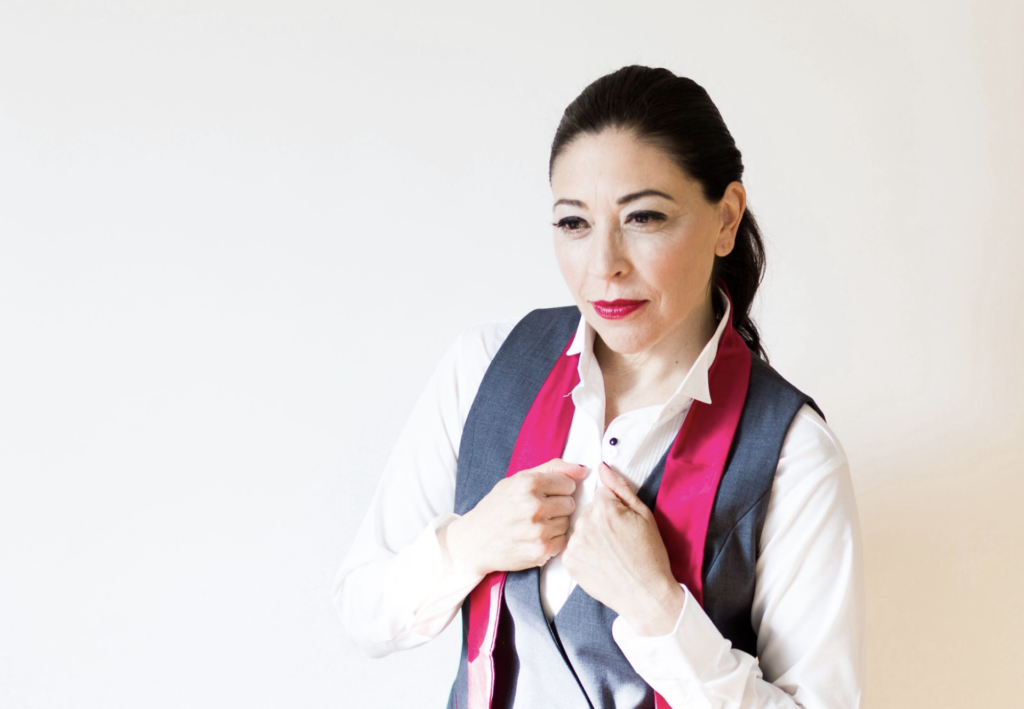
Tina D’Elia is serving up a fizzy cocktail of sentiment, schtick and tribute at the Marsh this month. Her solo showcase, “Overlooked Latinas,” pays an affectionate salute to mid-20th Century Hollywood actresses including Lupe Velez, Rosaura Revueltas and Rita Hayworth (born Margarita Cansino).
D’Elia does brief bits in each of these celebrities’ personae over the course of a cornucopian performance, but the dominant personality in this show—impish, exuberant and inexhaustible—is her own. Had Elia been around in the era of her honorees, one could easily imagine her crashing the era’s most famous comedic fraternity as a self-proclaimed Chica Marx. (Marxism of another sort rears its head as some of the show’s movie stars get blacklisted in 1950s).
Alone on stage for 75 minutes with no props or scenery other than a couple of chairs, D’Elia shifts between multiple parts, pulling faces, cracking wise, doing funny walks and quirky voices. But unlike Lily Tomlin or Whoopi Goldberg, whose celebrated one-woman shows found them sequentially embodying each of several roles in a series of discrete monologues, D’Elia pops in and out of her dozen or so characters, often generating rapid-fire banter between them, as she builds an overarching narrative with the appealing shagginess and speed of improv sketch comedy.
It’s the story of “butch dykes” Angel and Carla who successfully pitch a network television executive on their pilot “Overlooked Latinas” (about the social and industry prejudices that effected the aforementioned Latinx actresses and their peers); outlandishly have it picked up for 16 seasons before production even begins; and then dive into a shooting schedule that bubbles with silly, soapy melodrama: Angel’s partner Lena unexpectedly arrives on set only to discover that her spouse’s sexy ex has been cast in a leading role. Lena is also hellbent on insemination, and pits her own desire for motherhood against Angel’s nurturing of her TV brainchild.
D’Elia always provides enough vocal and physical distinctions to keep it clear which character is which, but she never disappears behind them. With her hair pulled back in a ponytail, wearing black track pants and running shoes, D’Elia is actor-as-athlete, working out her creative muscles. “Overlooked Latinas” is as much a playground as a play, a space for its creator to flex and sprint and set her inner child free. Her glee is infectious.
In one of the show’s funniest bits (presented as a scene from the TV pilot), D’Elia plays out a chummy gay flirtation between an out-and-proud Ramon Navarro and a closeted Rudolph Valentino. Yet when it comes to her portrayals of the titular Latinas, D’Elia is at her most serious: Their brief, passionate speeches about mistreatment at the hands of the U.S. government and the need for solidarity among Latinx workers, whether film stars or field hands, are momentarily stirring, but oddly incongruous with the evening’s fundamentally giddy tone; D’Elia gets so caught up in the frantic frame story that her heroes, while not overlooked, still end up relatively under-represented.
More holistically, though, the show depicts a generous, loving bond between Latinx and queer women across time. The 20th century movie stars referenced in “Overlooked Latinas” helped pavethe way for a contemporary performer like D’Elia. She, in turn, has invented fictional characters who create their own showbiz success story by honoring their forebears.
The group hug that ends the show holds generations in its embrace.
